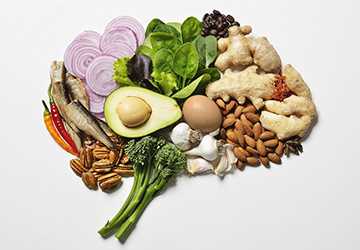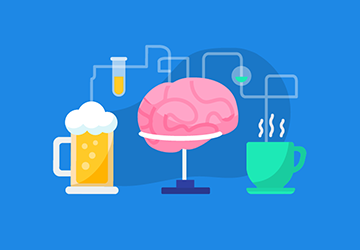The complex link between diet and mental health has become an increasingly recognised aspect of overall health. The food we eat not only affects our physical health; It also plays a vital role in our mental and emotional state. Understanding the connection between diet and mental health is crucial to taking a holistic approach to self-care. In this study, we explore what you should know about the complex link between diet and mental health.

1. Nutrients and Brain Function:
The brain is a highly metabolically active organ that requires ongoing nutrition to function optimally. Essential nutrients are critical for neurotransmitter production, energy metabolism, and overall neuronal health.
Nutrients essential for brain health:
● Omega-3 fatty acids: Fish, flax seeds, and walnuts are rich in fat and contain Omega-3 fatty acids, which are essential for brain structure and function.
● Antioxidants: Antioxidant-rich fruits and vegetables, such as berries and leafy greens, help protect the brain from oxidative stress.
● B vitamins: B vitamins are essential for synthesising neurotransmitters and are found in whole grains, leafy vegetables, and legumes.
2. Gut-Brain Axis:
The gut and brain are connected through the gut-brain axis, a two-way communication system. The health of gut microbiome is made up of trillions of microorganisms and affects mental health by regulating inflammation, neurotransmitter production and even behaviour.
Ways to support a healthy gut:
● Probiotics: Eating fermented foods like yoghurt, kefir, and sauerkraut can introduce beneficial bacteria into your gut.
● Fiber-rich foods: Whole grains, legumes, and fruits provide prebiotics that nourish gut bacteria.
● Limit processed foods: A diet rich in processed foods can negatively impact gut health.
3. Inflammation and Mental Health:
Chronic inflammation has been linked to a variety of mental illnesses, including depression and anxiety. Diet plays a crucial role in regulating inflammation; certain foods can increase or decrease the inflammatory response.
Anti-inflammatory foods:
● Fatty fish: Fish such as salmon and mackerel are rich in omega-3 fatty acids, which have anti-inflammatory effects.
● Turmeric: Curcumin, the active ingredient in turmeric, has powerful anti-inflammatory properties.
● Colorful fruits and vegetables: Berries, tomatoes, and leafy green vegetables contain antioxidants that fight inflammation.
4. The Impact of Sugar and Processed Foods:
High consumption of sugar and processed foods has been linked to an increased risk of mental health problems. These foods can cause rapid spikes and dips in blood sugar, affecting mood, energy levels, and cognitive function.
Ways to reduce your sugar and processed food intake:
● Read food labels: Look for added sugar in processed foods.
● Choose whole foods: Choose whole grains, lean proteins, fruits and vegetables instead of highly processed foods.
● Limit sugary drinks: Reduce sodas, energy drinks and juices consumption.
5. Micronutrient Deficiencies and Mental Health:
Deficiencies in specific vitamins and minerals can negatively impact mental health. For example, insufficient levels of vitamin D, vitamin B12, and iron have been linked to conditions such as depression and fatigue.
Sources of crucial mental health nutrients:
● Vitamin D: Sun exposure, oily fish and fortified foods.
● Vitamin B12: meat, fish, eggs, dairy products.
● Iron: Lean meats, beans, lentils and green leafy vegetables.
6. The Role of Proteins in Neurotransmitter Production:
Proteins are essential for synthesising neurotransmitters, the chemical messengers that facilitate communication between nerve cells. Amino acids are the building blocks of proteins and play specific roles in the production of neurotransmitters.
Foods rich in protein:
● Lean meats: Chicken, turkey, and fish are excellent sources of high-quality protein.
● Plant-based protein: Beans, tofu, and quinoa provide protein for vegetarians.
● Dairy products: Milk, yoghurt and cheese increase protein intake.
7. Production of Complex Carbohydrates and Serotonin:
Complex carbohydrates play an essential role in the production of serotonin, a neurotransmitter associated with mood regulation and well-being. Eating whole grains, legumes, and vegetables can help maintain stable serotonin levels.
Sources of complex carbohydrates:
● Whole grains: Brown rice, quinoa, oats and whole grains.
● Legumes: Lentils, chickpeas and black beans are rich in complex carbohydrates and fibre.
● Vegetables: Nutrient sources include broccoli, sweet potatoes and green leafy vegetables.
8. Hydration and Cognitive Function:
Dehydration can impair cognitive function and cause fatigue and poor concentration. Staying well-hydrated helps with overall brain health and mental performance.
Tips for drinking enough fluids:
● Drink water regularly: Drink at least eight glasses (64 ounces) of water daily.
● Eat more hydrating foods: Fruits with high water content, such as watermelon and cucumber, can help replenish your body.
9. Individual Differences and Personalised Nutrition:
It's important to realise that people may respond differently to different eating habits. Personalised nutrition considers genetic, metabolic and lifestyle factors to tailor nutritional recommendations for optimal mental health.
Personalised Nutrition Considerations:
● Genetic testing: Some people may benefit from genetic testing to learn how their bodies metabolise certain nutrients.
Lifestyle Factors: Consider individual differences in lifestyle, activity, and stress levels when developing a personalised nutrition plan.
10. Mindful Eating Benefits Mental Health:
Mindful eating means being aware and focused, positively impacting mental health. It promotes a healthy relationship with food and encourages enjoyment and satisfaction.
Mindful eating habits:
● Enjoy every bite: Consider taste, texture and aroma.
● Avoid distractions while eating: Minimise electronic devices and other distractions.
● Listen to hunger and satiety signals: Tune into your body’s hunger and satiety signals.
11. Effects of Caffeine and Alcohol:
While moderate consumption of caffeine and alcohol is generally considered safe for many people, excessive consumption can have adverse effects on mental health. Both substances can disrupt sleep patterns and cause anxiety or mood swings.

Spend in moderation and prudence:
● Limit caffeine: Be mindful of when and how much you drink caffeinated beverages, especially in the afternoon and evening.
● Drink in moderation: If you drink alcohol, drink in moderation and be aware of possible effects on sleep and mood.
12. Nutrition and Mental Health Across the Lifespan:
The connection between nutrition and mental health is relevant at every stage of life. From prenatal nutrition that affects fetal brain development to nutrition in older people that supports cognitive function, the impact of eating habits lasts throughout life.
Critical reflection on different stages of life:
● Prenatal nutrition: Adequate intake of nutrients such as folic acid and omega-3 fatty acids is crucial for fetal brain development.
● Nutrition in childhood: A balanced diet benefits children's cognitive development and mental health.
● Diet for teenagers: Nutritious foods can help stabilise mood and maintain youthful vitality.
● Nutrition for adults and older adults: A varied and nutrient-dense diet is critical to maintaining cognitive function as we age.
13. Seek Professional Mental Health and Nutritional Advice:
For those suffering from mental health problems or special dietary needs, it is vital to seek professional advice. Registered dietitians, nutritionists, and mental health professionals can work together to develop a comprehensive nutritional and psychological strategy.
When to seek professional advice:
● Mental health issues: If you are experiencing symptoms of anxiety, depression, or other mental illness.
● Nutritional deficiencies: When diagnosing nutritional deficiencies that may hurt mental health.
● Complex Nutritional Needs: Individuals with specific nutritional needs due to health conditions or lifestyle choices.
14. Establish a Sustainable and Enjoyable Approach:
A sustainable and enjoyable approach to nutrition is critical to long-term success. Restrictive diets or extreme approaches may not be sustainable, and finding a balance that suits personal preferences and lifestyles is essential.
Recommendations for establishing a sustainable approach:
● Variety and balance: Make sure you have various food choices to ensure a variety of nutrients.
● Flexibility: Allow for occasional indulgences and flexibility in dietary choices.
● Enjoyment: Choose foods that bring pleasure and satisfaction and promote a positive relationship with food.
15. Community and Social Support:
Participating in a supportive community or seeking social support can positively impact mental health and nutrition. Sharing experiences, sharing recipes and learning from others can increase motivation and build connections.
Ways to encourage community support:
● Take a cooking or nutrition class: Take a class that promotes healthy cooking and nutrition.
● Online communities: Connect with online groups or forums on nutrition and mental health.
● Family and Friends: Share healthy meals and experiences with friends and family.
Conclusion:
The link between nutrition and mental health is a dynamic and complex relationship still being studied and understood. Recognising the profound impact eating habits have on mental health empowers individuals to make informed decisions that contribute to overall health. Whether through nutrient-dense foods, mindful eating habits, or a personalised nutrition plan, a holistic approach to nutrition can be a powerful tool for promoting mental health. As research advances, it becomes increasingly essential to incorporate nutritional principles into mental health care, emphasising the interplay between physical and psychological health in pursuing a healthier, more fulfilling life.






